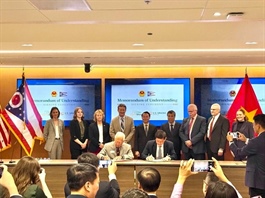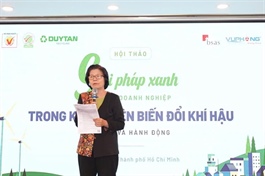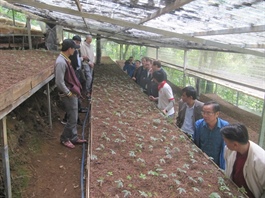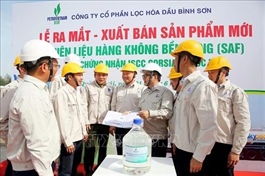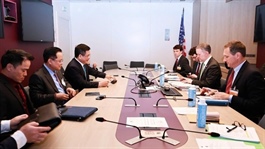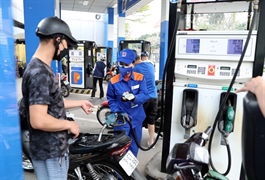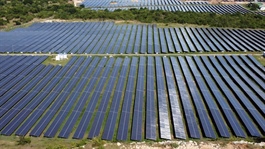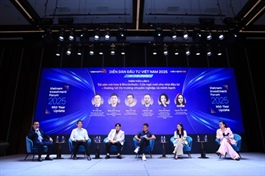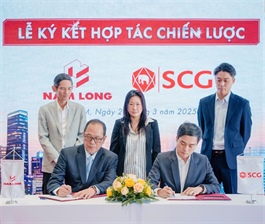Offshore wind sector requires pinpoint mechanisms
Offshore wind sector requires pinpoint mechanisms
With Vietnam setting ambitious offshore wind targets, global players like DNV are eyeing opportunities to transfer international experience and build local capacity. Zhang Minghui, Asia-Pacific offshore wind lead at DNV Energy Systems, gave VIR’s Nguyen Thu the insights on Vietnam’s potential and needs in this area.
How do you assess Vietnam’s offshore wind (OSW) potential, especially in comparison with other Asia-Pacific countries?

Zhang Minghui, Asia-Pacific offshore wind lead at DNV Energy Systems |
As outlined in the revised Power Development Plan VIII (PDP8), Vietnam aims to achieve 6-17GW of OSW capacity between 2030 and 2035, reflecting the country’s growing commitment. This is in addition to the country’s aim to achieve an expected onshore wind capacity of 26-38GW by 2030, which also includes nearshore wind opportunities.
Among its Southeast Asian counterparts, Vietnam offers good offshore potential with its long coastlines. It is therefore important to ensure that Vietnam’s grid infrastructure can keep up with these ambitions, given that in some provinces, the grid curtailment has been of a concern due to the increase in renewable projects.
In addition, it is also important to have sufficient feed-in tariffs to make OSW attractive to developers investing in Vietnam.
Where does Vietnam currently stand in its OSW journey compared to markets like Taiwan or South Korea, in terms of both policy framework and technical readiness?
First of all, each market’s journey is unique due to several factors, such as its geographical location, subsidies, and regulatory framework. Due to its experience in the oil and gas sector, Vietnam has the advantage of having companies and workforce already familiar with offshore conditions, which can help them to pivot more easily to building relevant infrastructure in the country.
In addition, while the market is relatively nascent in the country, there are local companies who have supported overseas OSW projects, and they can leverage this expertise and support Vietnam’s development.
With the revised PDP8, this outlines the ambitions for renewables, which is similar to other markets. One thing that is common is the need for a strong policy framework to attract developers and investors to invest in this area.
How do you think the PDP8 will influence the development of OSW projects in Vietnam, and are there any regulatory gaps that still need to be addressed?
The plan outlines Vietnam’s commendable ambitions in driving OSW and making it a key component of the country’s renewable energy transition.
To make this possible, there is a need for a strong regulatory framework and robust infrastructure, as well as a stable supply chain. There are current discussions with the relevant stakeholders on the support required from the regulators, so it remains too early to assess the regulatory gaps, if any.
The current focus for Vietnam would therefore be to present a clear framework and pipeline, as well as offer visibility on infrastructure upgrades and how the industry and supply chain should come together.
You have served as an independent engineer, or owner’s engineer, for several OSW projects in Taiwan. What valuable lessons from these projects can be applied to Vietnam?
Compared to Europe, which has a more mature supply chain, the Asia-Pacific supply chain is still relatively new and there is a need for collaboration not just for contractors but also for resources.
As the projects move further away offshore, there is a need to consider the vessel availability and weather window, as these are often long lead items that would be part of the critical path to further driving Vietnam’s OSW growth.
Having a strong owner’s engineer is important as it can also help in the managing of interfaces and for projects where there are multiple contracts as opposed to a turnkey engineering, procurement, and construction model, which would help in the mitigation of risks. It is highly advisable to engage a strong owner’s engineer team with local expertise with access to global best practices through experience in worldwide projects.
Since the beginning of OSW in the region, DNV has been leveraging our regional experts, such as having our Vietnamese colleagues supporting projects overseas such as Taiwan, South Korea, Japan, and the Philippines, and therefore, in return, they can leverage this experience and bring that back to their home markets.
We have also been leading various technical seminars in Vietnam where we can share our experiences with other external stakeholders that can help us drive OSW together in Vietnam in the nation’s commitment to realising its ambitions for renewable energy and sustainability.
- 09:34 06/06/2025







